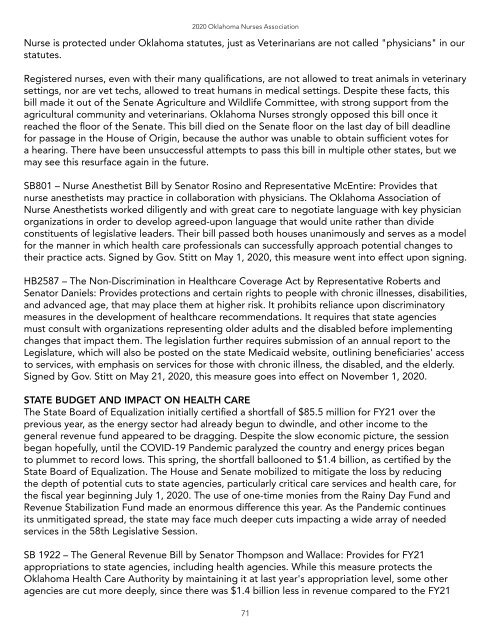Oklahoma 2020 Book of Reports
You also want an ePaper? Increase the reach of your titles
YUMPU automatically turns print PDFs into web optimized ePapers that Google loves.
<strong>2020</strong> <strong>Oklahoma</strong> Nurses Association<br />
Nurse is protected under <strong>Oklahoma</strong> statutes, just as Veterinarians are not called "physicians" in our<br />
statutes.<br />
Registered nurses, even with their many qualifications, are not allowed to treat animals in veterinary<br />
settings, nor are vet techs, allowed to treat humans in medical settings. Despite these facts, this<br />
bill made it out <strong>of</strong> the Senate Agriculture and Wildlife Committee, with strong support from the<br />
agricultural community and veterinarians. <strong>Oklahoma</strong> Nurses strongly opposed this bill once it<br />
reached the floor <strong>of</strong> the Senate. This bill died on the Senate floor on the last day <strong>of</strong> bill deadline<br />
for passage in the House <strong>of</strong> Origin, because the author was unable to obtain sufficient votes for<br />
a hearing. There have been unsuccessful attempts to pass this bill in multiple other states, but we<br />
may see this resurface again in the future.<br />
SB801 – Nurse Anesthetist Bill by Senator Rosino and Representative McEntire: Provides that<br />
nurse anesthetists may practice in collaboration with physicians. The <strong>Oklahoma</strong> Association <strong>of</strong><br />
Nurse Anesthetists worked diligently and with great care to negotiate language with key physician<br />
organizations in order to develop agreed-upon language that would unite rather than divide<br />
constituents <strong>of</strong> legislative leaders. Their bill passed both houses unanimously and serves as a model<br />
for the manner in which health care pr<strong>of</strong>essionals can successfully approach potential changes to<br />
their practice acts. Signed by Gov. Stitt on May 1, <strong>2020</strong>, this measure went into effect upon signing.<br />
HB2587 – The Non-Discrimination in Healthcare Coverage Act by Representative Roberts and<br />
Senator Daniels: Provides protections and certain rights to people with chronic illnesses, disabilities,<br />
and advanced age, that may place them at higher risk. It prohibits reliance upon discriminatory<br />
measures in the development <strong>of</strong> healthcare recommendations. It requires that state agencies<br />
must consult with organizations representing older adults and the disabled before implementing<br />
changes that impact them. The legislation further requires submission <strong>of</strong> an annual report to the<br />
Legislature, which will also be posted on the state Medicaid website, outlining beneficiaries' access<br />
to services, with emphasis on services for those with chronic illness, the disabled, and the elderly.<br />
Signed by Gov. Stitt on May 21, <strong>2020</strong>, this measure goes into effect on November 1, <strong>2020</strong>.<br />
STATE BUDGET AND IMPACT ON HEALTH CARE<br />
The State Board <strong>of</strong> Equalization initially certified a shortfall <strong>of</strong> $85.5 million for FY21 over the<br />
previous year, as the energy sector had already begun to dwindle, and other income to the<br />
general revenue fund appeared to be dragging. Despite the slow economic picture, the session<br />
began hopefully, until the COVID-19 Pandemic paralyzed the country and energy prices began<br />
to plummet to record lows. This spring, the shortfall ballooned to $1.4 billion, as certified by the<br />
State Board <strong>of</strong> Equalization. The House and Senate mobilized to mitigate the loss by reducing<br />
the depth <strong>of</strong> potential cuts to state agencies, particularly critical care services and health care, for<br />
the fiscal year beginning July 1, <strong>2020</strong>. The use <strong>of</strong> one-time monies from the Rainy Day Fund and<br />
Revenue Stabilization Fund made an enormous difference this year. As the Pandemic continues<br />
its unmitigated spread, the state may face much deeper cuts impacting a wide array <strong>of</strong> needed<br />
services in the 58th Legislative Session.<br />
SB 1922 – The General Revenue Bill by Senator Thompson and Wallace: Provides for FY21<br />
appropriations to state agencies, including health agencies. While this measure protects the<br />
<strong>Oklahoma</strong> Health Care Authority by maintaining it at last year's appropriation level, some other<br />
agencies are cut more deeply, since there was $1.4 billion less in revenue compared to the FY21<br />
71

















